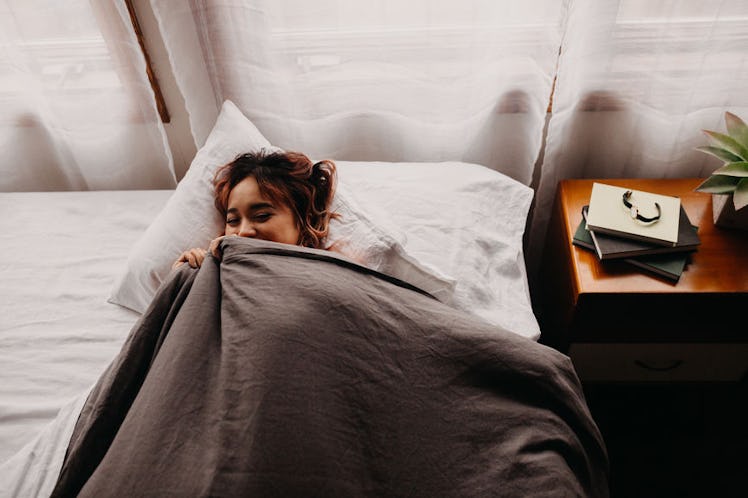
Sleep Experts Reveal What The Snooze Button Is Really Doing To Your Body Every Morning
I have a confession to make. Once upon a time, there was a point in my life when I was setting two hours worth of alarms in 15-minute increments. I know how excessive that sounds, but seriously, each time I was able to snooze the alarm and cocoon back into my cozy bed, I felt an incredible rush of comfort. These days, I'm a little more aware of how the snooze button affects sleep, so I only allow myself one snooze at most before I unravel myself from my blanket burrito. If you, too, tend to have an unhealthy relationship with your alarm clock's snooze button, I have some not-so-good news for you, my friend: That button isn't doing your sleep health any favors.
According to Martin Reed, a certified health education specialist and founder of Insomnia Coach, those few extra minutes of shut-eye might feel blissful in the moment, but in reality, they're probably hurting your body more than helping it. "Unfortunately, all the snooze button does is give us the opportunity for more interrupted sleep," Reed tells Elite Daily in an email. "When a sleep cycle is interrupted, we wake feeling a sense of grogginess and lethargy (this is known as sleep inertia) — and these symptoms can last up to an hour."
Basically, unless you're just turning off your alarm to lie awake in your bed for a little while, repeatedly reaching for the snooze button to savor a few more minutes of precious sleep is likely just confusing your body more than anything else.
See, when you press the snooze button instead of just peeling yourself out of bed, "first, you're fragmenting what little extra sleep you're getting so it is of poor quality," Robert Rosenberg, medical director of the Sleep Disorders Centers of Prescott Valley and Flagstaff, Arizona, told CNN back in 2014. "Second, you're starting to put yourself through a new sleep cycle that you aren't giving yourself enough time to finish." According to Rosenberg, that stop-and-start pattern can easily leave you feeling groggy throughout the rest of the day.
The good news is, as is the case with many things in life, snoozing for a couple extra minutes here and there won't do too much damage to your sleep health — that is, if you do it in moderation. "Something like 10 minutes shouldn’t have any negative side effects," says Reed. It's the multiple alarms (like the ones I used to set), he explains, that do the most harm.
What's really fascinating, BTW, is that your urge to press snooze every morning may shed some light on who you are as a person. In a survey of over 1,000 Americans, the mattress company Sleep Junkie discovered that your snooze habits can reveal a lot about your personality. For instance, the survey found that Americans who woke up thinking about work and money (relatable, TBH) were less likely to snooze their alarms in the morning. Even more interesting was the survey's discovery that the more a person's partner hit the snooze button, the lower their reported relationship satisfaction was. So if you share a bedroom with your significant other, you might want to check in and make sure you're both on the same page for those multiple morning alarms.
It's pretty clear that the snooze button is more foe than friend, but believe it or not, it may be best not to set any alarm at all for yourself in the morning. According to Dr. Benjamin Smarr, a National Institutes of Health postdoctoral fellow at UC Berkeley and Reverie sleep advisory board member, waking up naturally is healthier because "you let your body and brain finish doing maintenance before putting yourself back on the road." And by "naturally," Dr. Smarr means waking up without any type of alarm. While it will probably take a little while for your body to get used to waking itself up on a regular basis, he says the benefits will be well worth it.
To jump-start this natural wake-up, Martin Rawls-Meehan, CEO and co-founder of Reverie, tells Elite Daily in an email that he recommends swapping out your beloved IG-stalking session for some good old-fashioned reading or meditating. As much as I'm obsessed with the latest Tasty videos, if, as Dr. Smarr suggests, the alarm-free method helps me wake up with more energy than ever before, it just might be worth it.